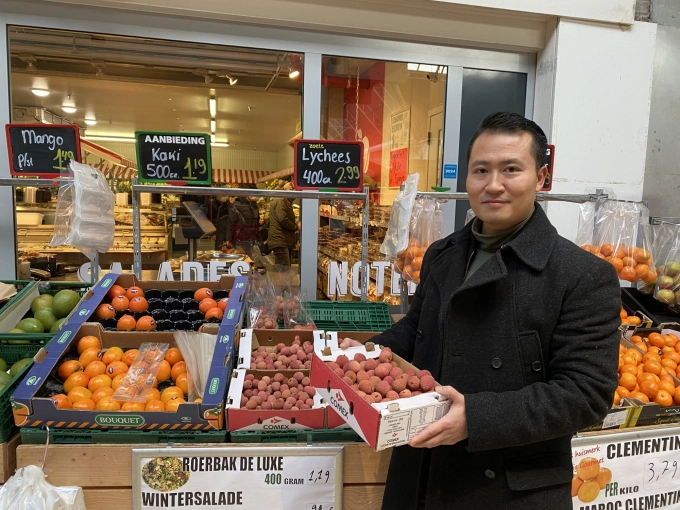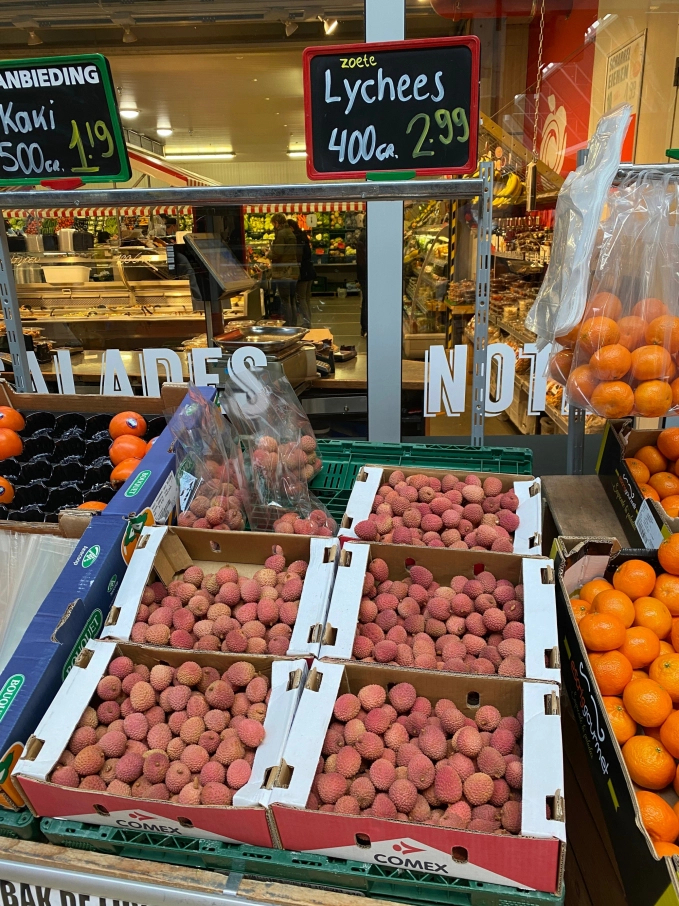May 17, 2025 | 20:59 GMT +7
May 17, 2025 | 20:59 GMT +7
Hotline: 0913.378.918
May 17, 2025 | 20:59 GMT +7
Hotline: 0913.378.918

Mr. Nhu Nguyen next to a shelf selling lychee in the Dutch market.
In 2021, reports showed that European businesses have received and consumed nearly 50 tons of lychee imported from Vietnam.
In particular, the first batches of Bac Giang’s lychee boldly entered the Dutch market through official channels with high selling prices even for the spending level of people in this country. 1kg of Bac Giang lychee was sold for €18 to €20 in the Netherlands last year, about more than VND550,000.
Although lychees are only sold in Asian supermarkets, with customers mainly from this continent, they are highly appreciated by consumers. Within a few days, the delicious red lychees were consumed at a rapid rate.
Ms. Vo Thi Ngoc Diep, Vietnam Trade Counselor in the Netherlands said: “I am proud and happy because this is the first time Vietnam opened a container to export Vietnamese fresh lychees to Europe. This is an important milestone for Vietnamese businesses, making them invest more methodically in the future, and simultaneously open up the future of exporting fresh fruit to the European market in a sustainable way.”

This year, Vietnamese lychee is still absent from Asian supermarket shelves in the Netherlands.
At the moment, Bac Giang and Hai Duong, the two largest lychee granaries in our country, are ready for harvest. According to the Bac Giang Department of MARD, this year's lychee production is expected to reach about 180,000 tons. The area of lychee production according to VietGAP standards is 15,400ha, and GlobalGAP standards are 82ha.
This year, lychee has a delicious taste and outstanding quality due to favorable weather, strong growth, and pests and diseases being controlled. According to information from Bac Giang province, it can be affirmed that lychees in 2022 have the best quality ever.
Thus, with advantages in both quality and quantity, the potential for Vietnamese lychee to enter the European market is huge. However, at present, Vietnam's fresh lychees are still absent from the shelves of Asian supermarkets.
Meanwhile, according to some Dutch newspapers, many importing companies here are bringing lychee from Pabna, Bangladesh to the Dutch market.
In reality, fruit from Asia, including Vietnamese lychee, are showing great potential for development in the Netherlands market. However, if the export path for lychee fruit is opened without a long-term development plan, international competitors can also easily enter the Netherlands and other European countries.

Currently, the lychees sold in Europe are mainly from Bangladesh.
Taking advantage of earlier summer, favorable soil advantages, and less pest density compared to neighboring areas, the Pabna region in Bangladesh promises a bountiful lychee crop this year. The import price of litchi from this region is currently recorded at about €5/kg.
In addition, the Pabna lychee growing area in Bangladesh covers an area of 4,731 ha, with an output of nearly 50,000 tons. Although this is considered the largest output of this region, it is not enough to meet the import demand, domestic consumption, and re-export to neighboring countries of the Netherlands.
The import turnover of the Netherlands agricultural products in the first nine months of 2021 reached $14.2 billion, up 2.8% over the same period in 2020. It can be said that this is the importing gateway for most agro-products from Asia.
Currently, more than 20% of fresh fruit and vegetables supplied by developing countries to Europe are supplied to Europe through the Netherlands, mainly through the Rotterdam port. Therefore, the Netherlands can be considered the leading export market for Vietnamese agro-products to Europe, including fruits such as lychee.
In addition, the demand of the Dutch people in particular and Europe in general for lychee is increasing, because this is a nutritious tropical fruit, providing high vitamin content. Lychee has a refreshing, subtly sweet flavor, and is easy to be included in many different dishes.
According to a survey by VIEC Company specializing in import-export trade consulting between the Netherlands and Vietnam, in the Netherlands market, lychee is popular and is consumed all year round. When it is not possible to buy fresh lychee because it is out of season, people still try to order canned lychee or soaked in syrup.
In addition, some manufacturers of vitamin powders specialized for dieters or athletes have added lychee flavor to their product lines and received positive feedback from the market.
Consequently, this is a favorable time for Vietnamese lychee to take advantage of its large planting area and improved quality. In addition to exporting seasonal fresh lychee, products made from lychee should also be paid more attention to. Processed lychee products not only help improve the value chain, and increase revenue and profit but also ensure Vietnamese agro-products always retain their market share in foreign countries.
Through products made from Vietnamese lychee, people in the Netherlands can enjoy this fruit all year round. They will gradually stop assuming that lychee only comes from China.
An important key in trade, especially international trade today, is to focus on direct export and reduce the supply chain. The lychee fruit of Vietnam in particular and other agro-products, in general, should be offered directly to large importers in the Netherlands, or general agents and supermarket chains, instead of going through too many intermediaries. This contributes to reducing costs while improving market access opportunities and affirming Vietnamese brands in the international market.
Translated by Hoang Duy

(VAN) In the face of counterfeit and imitation products, Khanh Hoa Salanganes Nest Company hopes for the prompt completion of the legal framework, strict enforcement against violations, and protection of the bird’s nest brand.

(VAN) Japan's efforts to lower the price of rice through the release of its stockpile may finally be making some progress, albeit at a snail's pace.

(VAN) U.S. tariffs are not only a 'shock', but also an opportunity for Vietnamese businesses to renew their mindset toward comprehensive development.

(VAN) As Bac Giang lychee enters the harvest season, Minister Do Duc Duy expects that the fruit will contribute greatly to agricultural exports due to standardized production and deep processing.

(VAN) Consumers have shown a preference for free-range eggs, but those farming systems are more vulnerable to biosecurity risks like bird flu.
/2025/05/09/5701-1-184335_301.jpg)
(VAN) Vietnam’s eel exports nearly doubled thanks to a mud-free farming model, opening up new prospects while still facing numerous barriers related to international standards.

(VAN) Minister Do Duc Duy warned that if production is not professionalized and supply chains are not transparent, the U.S. market could become a growth bottleneck.